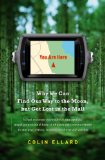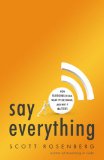new book – ‘The Oxford Companion to Consciousness’
July 20, 2009

Something to check out, especially for those with access to an academic library: The Oxford Companion to Consciousness edited by Tim Bayne, Axel Cleeremans, and Patrick Wilkens.
Product Description from the publisher:
Consciousness is undoubtedly one of the last remaining scientific mysteries and hence one of the greatest contemporary scientific challenges. How does the brain’s activity result in the rich phenomenology that characterizes our waking life? Are animals conscious? Why did consciousness evolve? How does science proceed to answer such questions? Can we define what consciousness is? Can we measure it? Can we use experimental results to further our understanding of disorders of consciousness, such as those seen in schizophrenia, delirium, or altered states of consciousness?
These questions are at the heart of contemporary research in the domain. Answering them requires a fundamentally interdisciplinary approach that engages not only philosophers, but also neuroscientists and psychologists in a joint effort to develop novel approaches that reflect both the stunning recent advances in imaging methods as well as the continuing refinement of our concepts of consciousness.
In this light, the Oxford Companion to Consciousness is the most complete authoritative survey of contemporary research on consciousness. Five years in the making and including over 250 concise entries written by leaders in the field, the volume covers both fundamental knowledge as well as more recent advances in this rapidly changing domain. Structured as an easy-to-use dictionary and extensively cross-referenced, the Companion offers contributions from philosophy of mind to neuroscience, from experimental psychology to clinical findings, so reflecting the profoundly interdisciplinary nature of the domain. Particular care has been taken to ensure that each of the entries is accessible to the general reader and that the overall volume represents a comprehensive snapshot of the contemporary study of consciousness. The result is a unique compendium that will prove indispensable to anyone interested in consciousness, from beginning students wishing to clarify a concept to professional consciousness researchers looking for the best characterization of a particular phenomenon.




